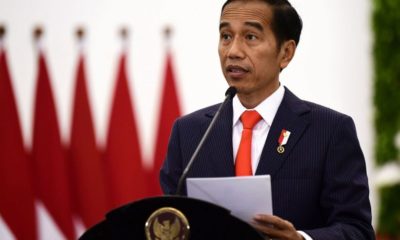World
Meet the 2 year old boy who smokes 40 times in a day

Indonesia : The two-year-old boy who became an international sensation after he was found chain smoking in a remote village has kicked the habit, lost weight and is now the ‘champion’ of his primary school.
Aldi Rizal shot to fame in 2010 after he was discovered in a poor village in Sumatra, Indonesia, puffing 40 cigarettes a day while riding his tricycle.
Two years on he’s now a normal, cheeky five-year-old – and, while he’s managed to kick the habit, he now has another addiction. Food.
Aldi Rizal became an international media sensation when he was discovered in a poor village in Sumatra, Indonesia, puffing on a cigarette while riding his tricycle.
Just two years later the little boy managed to quit with the help of the Indonesian government providing special rehabilitation, but he replaced his smoking addiction with food and drastically gained weight.
The outcry led to the Indonesian government launching a campaign to tackle the problem of children smoking and organising special rehabilitation treatment to help Aldi quit.
Aldi was taken for play therapy sessions in the capital Jakarta for two weeks to take his mind off his 40-a-day habit and learn to be a normal toddler for the first time.
A new documentary series revisits the family two years on to find out how Aldi is getting on and reveals he has managed to stay off the cigarettes, but is still dangerously unhealthy.
During his rehabilitation treatment, Aldi saw psychiatrists who encouraged his mother to keep him busy with playing and taught her about the dangers of smoking.
Doctors hope that if Aldi can lose around half a stone to a stone, his weight will eventually even out as he starts to grow taller.
It is thought one-third of children in Indonesia try smoking before the age of ten. The Government has launched efforts to tackle the problem.
World
Lockdowns in China Force Urban Communities to Defy Censorship and Vent Frustration Online

Shanghai’s rich middle class is leading a wave of online dissent over the strict and prolonged lockdowns imposed in various parts of the country. Chinese internet censorship is struggling as patience is wearing thin in many urban centers, coming up with creative forms of online protests.
Social Media Posts Revealing Lockdown Tension in Shanghai
Drawn-out lockdowns are nothing new in China as authorities insist with the nation’s zero-Covid policy since the start of the pandemic. Currently over This time around, however, metropolitan areas like Shanghai are increasingly difficult to keep quiet, given that its more than 25 million residents have seen weeks of total isolation along with food shortages and many other service interruptions.
Dozens of towns and reportedly over 300 million Chinese citizens have been affected by lockdowns of different severity. As expected, urban netizens have been most outspoken over their difficulties by finding creative ways to get around state censorship and bans placed on topics, news comments and spontaneous campaigns.
Shanghai residents have been using mobile proxies and hijacking seemingly unrelated hashtags to talk about healthcare issues, delivery failures and the overall severity of their situation. The “positive energy” that the Chinese government wants to transmit during the recent prolonged series of lockdowns does not come naturally to those counting food supplies and online censors are working hard to filter words, trending topics and undesired social media sharing.
WeChat groups and message threads are under constant monitoring. Posts questioning the zero-Covid approach have been quickly deleted, including by leading Chinese health experts like Dr. Zhong Nanshan. Video footage is soon censored and protests and investigations are quickly made to disappear.
Where this has not worked, officials have exposed banners with warnings and outright threats like “watch your own mouth or face punishment”, while drones have been patrolling the city skies. Yet, if anything, this has led to further tensions and unspoken confrontation with Shanghai’s educated and affluent middle class.
Creative Online Solutions Harnessing Civic Energy
Announcements by Chinese social media that they would be publishing the IP addresses of users who “spread rumors” have not helped either. Tech industry research has shown that much of Asia’s tech-savvy population has a habit of using mobile proxies and other privacy tools, quickly finding workarounds to browse the internet freely and talk to the world about the hottest topics.
The sheer volume of forbidden posts is already a challenge for the very censorship system, experts explain. Unable to track all trending hashtags, state workers overlook topics that speak about the US, Ukraine or other popular news. Linking human rights elsewhere to their situation, Chinese online dissidents establish their informal channels and “hijack” the conversation to share personal or publicly relevant information about the Covid suppression in their town.
Sarcastic and satirical posts still dominate. Others hope to evade the censors by replacing words from famous poems or the national anthem. One thing is certain – social media, when harnessed with the right creativity, has proven its ability to mount pressure on the government in even some of the most strictly controlled tech environments like China.


























